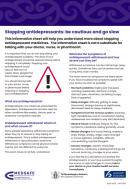If you're a frequent visitor to Healthify, why not share our site with a friend? Don't forget you can also browse Healthify without using your phone data.
Mirtazapine
Sounds like 'mer-taz-uh-peen'
Key points about mirtazapine
- Mirtazapine is used to treat moderate to severe depression.
- Mirtazapine is also called Mirtazapine (Noumed)®, Apo-Mirtazapine® and Zispin®.
- Find out how to take it safely and possible side effects.

Mirtazapine is an antidepressant used to treat moderate to severe depression. It's believed that mirtazapine works by increasing the activity of neurotransmitters (chemicals in your brain). Neurotransmitters pass signals from one brain cell to another. Although we don’t know for certain, the neurotransmitters that are most likely to be involved in depression are thought to be serotonin and noradrenaline.
Read more about antidepressants.
In Aotearoa New Zealand mirtazapine is available as 30 mg and 45 mg tablets.
If you need help or want to talk to somebody about your mental health, you can get support from any of the following:
- Free call or text 1737 any time for support from a trained counsellor
- Lifeline 0800 543 354 (0800 LIFELINE) or free text 4357 (HELP)
- Suicide Crisis Helpline 0508 828 865 (0508 TAUTOKO)
- Healthline 0800 611 116
- Samaritans 0800 726 666.
- Always take your mirtazapine exactly as your healthcare provider has told you. The pharmacy label on your medicine will tell you how much to take, how often to take it, and any special instructions.
- The usual starting dose of mirtazapine is 15 mg once a day and the usual ongoing dose is 30 mg daily.
- Some people may need higher doses.
- Your healthcare provider will start you on a low dose and if needed, will increase your dose slowly. This allows your body time to get used to the medicine and reduces side effects.
- Timing: Mirtazapine is usually taken once a day, at night, before going to bed. Take mirtazapine at the same time each day.
- Swallow the tablet with a glass of water: Don't chew it.
- Food: You can take mirtazapine with or without food.
- Missed dose: If you forget to take your dose, take it as soon as you remember that day. But if it's nearly time for your next dose, just take the next dose at the usual time. Don't take double the dose.
Here are some things to know when you're taking mirtazapine. Other things may be important as well, so ask your healthcare provider what you should know about.
- Alcohol: Avoid or limit alcohol while you're taking mirtazapine. Drinking alcohol can increase side effects of feeling sleepy, putting you at risk of falls and other accidents. This is especially important when you first start treatment.
- Driving: Be careful when driving or using tools until you know how this medicine affects you.
- The effects of mirtazapine aren’t immediate: It may take a few weeks before you notice the full benefits. Keep taking mirtazapine every day.
- Don’t stop taking mirtazapine suddenly: Talk to your healthcare provider before stopping. The dose is usually gradually reduced to avoid side effects.
- Other medicines: Mirtazapine interacts with a number of medicines, herbal supplements (such as St. John's Wort) and rongoā Māori. Check with your healthcare provider before starting mirtazapine or before starting any new medicines, especially pain relief medicines and other medicines that can cause drowsiness.
- Signs of an infection: If you have a fever, sore throat or sore mouth while taking mirtazapine, let your doctor know immediately. It’s rare, but the medicine can decrease the number of blood cells you make and this can affect how your body fights infections.
Like all medicines, mirtazapine can cause side effects, although not everyone gets them. Often side effects improve as your body gets used to the new medicine.
Suicidal behaviour
The use of antidepressants has been linked with self-harm or suicidal thoughts and behaviour. Children, teenagers, young adults and people with a history of suicidal behaviour are most at risk. This is most likely during the first few weeks of starting treatment or if the dose is changed. It's important to look out for signs of suicidal behaviour such as suicidal thoughts, self-harm, worsening of low mood, agitation or aggression. If you notice any of these signs, contact your doctor immediately.
If you need urgent help or are concerned, phone:
- Lifeline 0800 543 354 (available 24/7), or
- Healthline 0800 611 116, who can give you the phone number for your local mental health crisis line.
Other side effects
| Side effects | What should I do? |
|---|---|
|
|
|
|
|
|
|
|
|
|
|
|
|
|
Read more about medicines and side effects and reporting a reaction you think might be a side effect.
The following links provide further information on mirtazapine.
Mirtazapine (Noumed)(external link) Medsafe Consumer Information Sheet, NZ
Brochures
Stopping antidepressants: be cautious and go slow(external link) Medsafe, NZ, 2023
5 questions to ask about your medications(external link) Health Quality and Safety Commission, NZ, 2019 English(external link), te reo Māori(external link)
References
- Mirtazapine(external link) New Zealand Formulary, NZ
- Mirtazapine (Noumed)(external link) Medsafe data sheet, NZ
- The role of medicines in the management of depression in primary care(external link) BPAC, NZ, 2021
Brochures

Medicines and side effects
Healthify He Puna Waiora, NZ, 2024

Stopping antidepressants: be cautious and go slow
Medsafe, NZ, 2023

Health Quality and Safety Commission, NZ, 2019 English, te reo Māori
Credits: Sandra Ponen, Pharmacist, Healthify He Puna Waiora. Healthify is brought to you by Health Navigator Charitable Trust.
Reviewed by: Stephanie Yee, Pharmacist, Auckland
Last reviewed:





